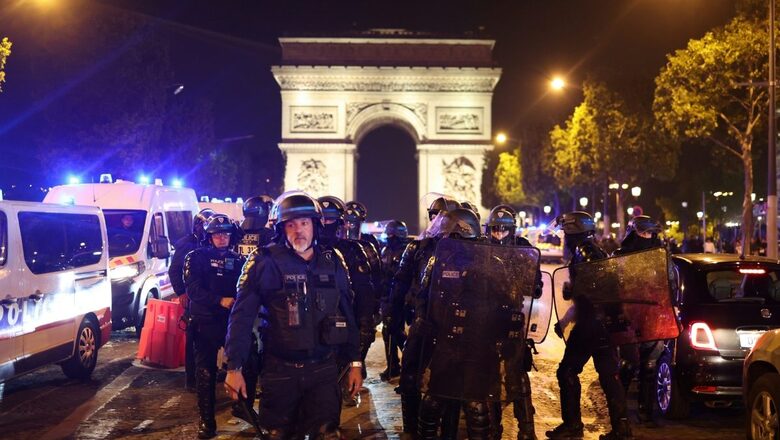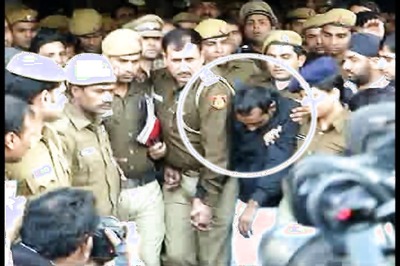
views
Back in 2019, just after Algeria won the African Cup, migrants terrorised French pedestrians and women, saying, “Look, look! Here we have the Algerians, Tunisians, Moroccans, and Senegalese. Marine, Marine (Le Pen)! We managed to take over Paris even faster than the German Army in 1940. It took us just 3 hours!”
It seems like a poetic retrieval for the Muslim refugees, for today France is burning, if not already razed. Police stations were sacked, charred vehicles strewn across roads, buildings damaged, streets vandalised, supermarkets ransacked, malls looted, libraries torched, schools set ablaze, and stones pelted at the police. President Emmanuel’s government is struggling to quell the widespread rioting in cities and towns across France.
Despite the deployment of almost 40,000 police officers, along with elite Raid and GIGN (Gendarmerie Intervention Group) units, violence and arson are being reported in myriad and diverse locations. While racist police violence and brutality, especially in Paris’s poorer suburbs, continue to be of simmering importance, in perspective, the unabating riots and the havoc wreaked in France by the Muslim refugees is yet another undeniable case of multiculturalism gone unhinged.
The chariot wheels of multiculturalism that set foot in Western civilisation under the pretext of being refugees from war-torn countries are now rearing their ugly heads. Of the many disturbing videos of upheavals in France, one of the most concerning videos displayed the rioting hordes destroying the largest public library by arson in the city of Marseille. And, in reflection, its history repeats itself. In 1200, Bakhtiyar Khilji destroyed Nalanda University, the world’s oldest university, symbolising Bharat’s rich knowledge, culture, and heritage.
Recall how Sweden has historically provided asylum to refugees, primarily from Syria, Iraq, and Afghanistan, taking in a record-high 162,877 applications for asylum in 2015. Ever since the influx of asylum seekers, records detail an uptick in violent crimes, including bombings, rapes, and gang violence. Sweden witnessed an unprecedented rise of over 100 bombings in 2019, twice the number in 2018. Most of these crimes find their roots in first- or second-generation immigrants.
On April 13, 2021, Kyösti Tarvainen, professor at the Aalto University of Helsinki, warned, “There has been a huge cultural change in the immigrant population, as its largest group has gone from being Finnish to being Muslim… with immigration unchanged, ethnic Swedes will be a minority in 2065.” “Multiculturalism is acceptance of diverse cultures,” “politicians believe in politics of division,” and “multiculturalism is progressive growth for dialogue” were some arguments by the Swedes to defend make-believe multiculturalism. Frustrated by the then-ruling establishment’s appalling response to immigration policies, the same Swedish people, once proud of “Swedish exceptionalism,” finally voted for a conservative government to grapple with the growing issue of assimilating the already large population of predominantly Muslim refugees.
In fact, the longstanding and sophisticated issue of illegal immigration has besieged India for decades. The long-term implications of having open borders are par for the course. In 2015, Chota Burmi, a member of the Rohingya community, was killed in a gunfight with the security forces. The foreign militant was affiliated with Jaish-e-Mohammad, the terror organisation responsible for many terror attacks in India, including the hijacking of IC-814 by Indian Airlines.
Alarmingly, according to the data that is available, thousands of Rohingya families are settling in the insurgent erstwhile state of Jammu and Kashmir. I would reckon that, in reality, the number surpasses all imaginations. For those who would accuse me of xenophobia, I’d ask: History dictates that the religious position and ethnic affiliation of the Rohingya community have always subscribed to the two-nation theory and have always had an animus against India. Shouldn’t their settlement in an already insurgent state be a significant question of national security?
Last year, violent confrontations broke out between the Hindu and Muslim communities in Leicester, long heralded as a sign of community cohesion. Pakistani Islamist organised gangs targeted Hindu houses, vandalised streets, and burned temple flags. At present, 90 percent of the demographic growth in Britain arises from immigration. Former British Prime Minister David Cameron said, “Multiculturalism is fostering extremist ideology and directly contributing to homegrown Islamic terrorism.” According to a British poll conducted after the London suicide bombings of July 2005 that killed 52 and injured 700 people, approximately six percent of Muslims in Britain justified the bombing, while another 24 percent sympathised with the killers, and 16 percent expressed no loyalty to Britain.
Therefore, contrary to what Leftist and liberal groups would have us believe, immigrants, loyal to their ethnic identities and past allegiances, have often failed to respect, if not adopt, the concomitant values, nationalistic sentiments, prevailing secularism, and established law of the native land they find refuge in. Hardliner immigrants have, in a pattern, attempted to impose their retrograde practises, most of which lock horns with the constitutional tenets of a country and the morally rich values of civil society.
This creeping imposition by the Muslim immigrants will surprise only those who continue to remain blind to arcane practises like the death penalty for homosexuals, religious indoctrination in schools and colleges, blocking roads for prayers, forcible female genital mutilation, death by stoning for female adulterers, divorce by triple talaq, remarriage by Nikah Halala, numerous restrictions on women, and even honour killing.
All this raises a clamant question: how long does a liberal democracy, in the name of communal amity, tolerate the tampering of their society’s secular and indigenous perspective, basic principles, and values? More pointedly: Should countries beef up their migration policies and scrutinise immigrants, in light of multiculturalism’s muddle and incoherence, to preserve their existing demographic composition and protect themselves from Islam or any other ideology of extremism?
In an article, scholar and columnist Gopal Goswami mentions, “Beginning in late 2010, the Arab Spring series was characterised by pro-democracy rallies across West Asia. These protests began peacefully but quickly became violent in certain countries, most notably Syria, Iraq, and Yemen. It started with a group of adolescent guys who spray-painted ‘people want the collapse of the dictatorship’ on buildings in Daraa. The teenagers were imprisoned and tortured, and one of them died. Over 5,00,000 Syrians have perished since then, and over 5 million Sunni Muslims out of Syria’s 22 million people have fled the nation.”
As per UN reports, if they are to be given credence and believed, “More than 6.8 million Syrians have been forced to flee their country since 2011.” In one of its research papers, the Brookings Institution mentions, “Arab Sunni Muslims comprise about 65 percent of the Syrian population.” It further states that the number of registered refugees in neighbouring countries increased from 8,000 in 2011 to almost 500,000 only a year later and was well over four million in late 2015. Close to 500,000 Syrians entered Europe in 2015 by sea, making up the largest segment of the more than 1 million who sought safety in Europe during the year. In light of all such documented acts of vandalism and espionage by the Muslim refugees, my heart goes out to America, for, as per a report published by PEW Research, during Obama’s presidency alone, a record 5,60,000 Muslims were accepted as refugees in the United States. Conspicuously, the numbers stick and add up!
The time is propitious for the world to emerge as one family with one future to huddle on a common platform to ruminate on devising stringent immigration policies devoid of any partisan politics or ideological proclivity, keeping their nation, their culture, and their ethos at the centre before the perils of radicalisation plague and manifest the dream of a borderless Islamic world.
Yuvraj Pokharna is an independent journalist and columnist. He tweets with @iyuvrajpokharna. Views expressed are personal.


















Comments
0 comment